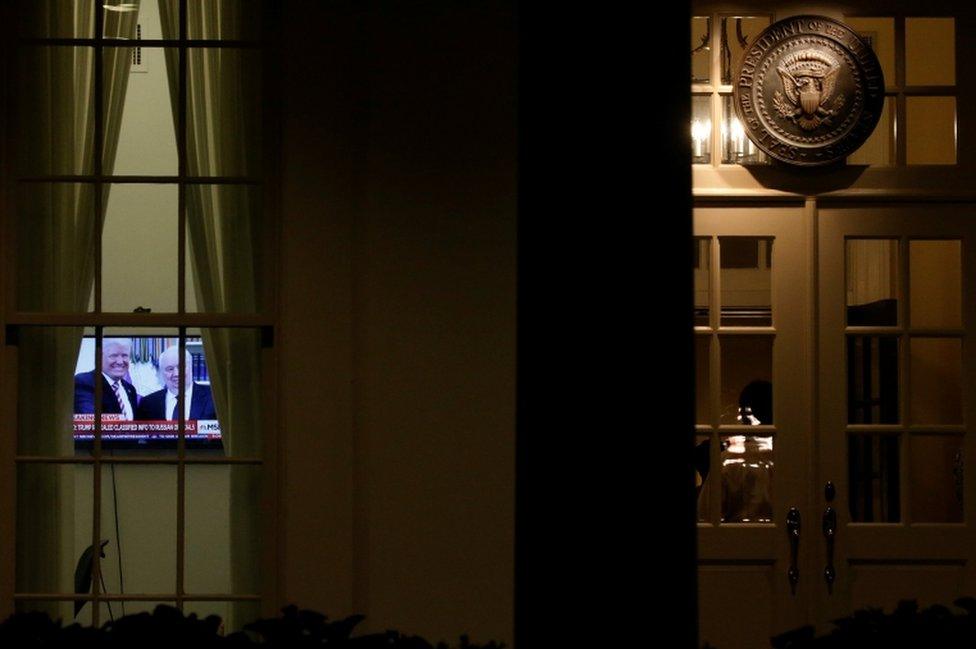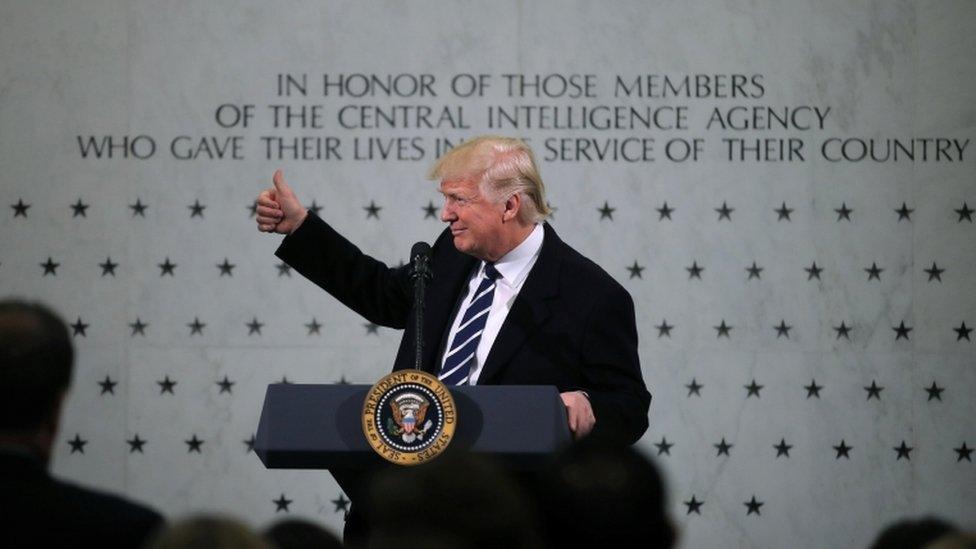White House reels from another self-inflicted crisis
- Published

A television at the White House shows Trump's meeting with the Russian ambassador
The relationship between this White House and the intelligence agencies hasn't been great. President Donald Trump's recent disclosures have made things worse.
National Security Adviser HR McMaster stood on a driveway outside the White House on Monday evening and tried to explain a delicate situation to journalists.
The Washington Post had reported , externalthat Trump revealed highly classified information to Russians during a meeting in the Oval Office.
Standing before reporters, Mr McMaster chose his words carefully.
His message was that the president had indeed revealed certain things - he'd spoken with the Russians about the fight against the Islamic State group, but that the president's revelations weren't as bad as you might think.
"The president did not disclose any military operations that were not already publicly known," Mr McMaster said, trying to reassure the reporters and the American public that everything was fine.
McMaster: 'Trump not even briefed on intel source or method'
Not long afterwards, reporters gathered in a hallway of the West Wing, hoping to find out more about what had happened.
While we were standing there, senior members of the White House staff walked quickly past us and filed into a meeting room.
One of my colleagues said he had seen Stephen Bannon, the president's senior adviser, and Sean Spicer, the White House press secretary, walk into the room.
Behind closed doors, the officials started speaking in loud voices, and a moment later someone turned up the volume on a television, so that we couldn't hear what was going on inside the room.
The mood in the White House on Monday evening was tense, and things seemed slightly out of control, showing an administration that barely seemed able to manage the chaotic nature of their boss, the president.
Why did Trump give information to the Russians? The reporter who broke the story explains.
He had - once again - talked about something he probably shouldn't have, and they were struggling to contain the fallout.
On Tuesday morning, Mr McMaster reappeared in the White House briefing room to drive home their message that Mr Trump's disclosure was "wholly appropriate".
Mr Trump's indiscretion has been particularly troubling for people who work at the CIA.
A spokesman for the CIA told me - unsurprisingly - that they had no comment about the reports.
How damaging is this for Trump?
Privately, though, many of them have been worried about President Trump.
On the day after the election, a former senior CIA official told me, the grounds of the CIA were spookily quiet.

Trump visited CIA headquarters the day after his election, and boasted of his inaugural crowd size
Many of the men and women who worked at the agency were troubled by his presidency, and they wanted a chance to think things through.
The recent disclosures in the Washington Post were hardly reassuring.
The president's decision to speak so freely was "a display of recklessness", said Steven Aftergood, director of the Project on Government Secrecy at the Federation of American Scientists.
The conversation that the president had with the Russians - and the explosive article about their meeting - has been unsettling for those who are steeped in the world of intelligence analysis.
The incident, said Mr Aftergood, reflected "escalating tensions between the White House and the intelligence community".
Still, people who are familiar with the White House and the intelligence agencies believe the incident won't cause permanent damage.
Chuck Schumer: "President Trump may have exposed our nation to greater risk"
The job of intelligence analysts is to provide the president with information and insight that he can use in order to keep the nation safe from attacks, and analysts will continue to focus on the task at hand - despite any tension in the relationship.
David Priess, author of The President's Book of Secrets, said he's lived through periods of turmoil between the White House and the intelligence agencies during the years that he spent as a CIA analyst and intelligence briefer.
Yet he and his colleagues had a near-universal response to the discord.
He said they "just put their heads down and do their work".